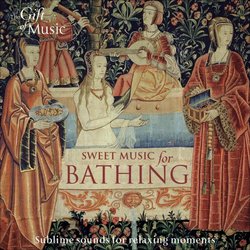| All Artists: Oxford Baroque;Martin Souter;Matthew Spring;Sara Stowe Title: Sweet Music for Bathing Members Wishing: 0 Total Copies: 0 Label: The Gift of Music Release Date: 3/4/2005 Genre: Classical Style: Symphonies Number of Discs: 1 SwapaCD Credits: 1 UPC: 658592108828 |
Search - Oxford Baroque;Martin Souter;Matthew Spring;Sara Stowe :: Sweet Music for Bathing
 | Oxford Baroque;Martin Souter;Matthew Spring;Sara Stowe Sweet Music for Bathing Genre: Classical
Sweet Music for Bathing Sublime sounds for quiet moments Pamper yourself - or a friend - with this luxuriant album of sweet music from a more seductive age. From slow dances to gentle songs of love, this programme is desig... more » |
Larger Image |
CD Details
Synopsis
Product Description
Sweet Music for Bathing Sublime sounds for quiet moments Pamper yourself - or a friend - with this luxuriant album of sweet music from a more seductive age. From slow dances to gentle songs of love, this programme is designed to relax and sooth the tired and flagging spirit and includes, 'O mistress mine', 'Sarabande', 'Hark, hark, the lark' and 'Beneath the myrtle shades'. Bathing has been practised as both a ritual and a pleasurable task since before the age of the Greeks. Ancient Egyptian paintings and hieroglyphs bear witness to the evidence of bathing, both for ritual purposes and personal hygiene. The temple priest was required to bathe and anoint himself with oil, four times each day and only then was he was prepared to perform religious rituals. The aristocracy would bathe in water, scented with fragrant oils. They believed that a bath should be a sensuous experience that should calm and soothe the mind. For the Greeks, bathing was quite fundamental to their way of life. For them, it was more of an event for pleasure rather than for ritual. It was common for a Greek to take a cold shower even before dining! It was Pisistratus (c.600-527BC), the popular ruler of Athens, who installed many bathing facilities in the grand buildings of the city. Men and women bathed nude in these public baths and would shower from fountains of cold water spouting from stone figures. The Romans viewed bathing as more of a necessity than a pleasurable task. It was not until the introduction of the hypocaust, a system of underfloor heating and air, that the Romans had a change of heart and accepted that bathing was an edifying and desirable experience. In time, bathing became central to Rome's social life. The Caracalla Baths could provide facilities for almost two thousand bathers. Bathers could also take advantage of a range of features including massage, swimming in the pool, using the gymnasium or indulging in a warm-water bath. It is hard to believe that there was a time when people believed that bathing could be fatal to one's health. The French nobility never used water for cleansing but instead applied powders and liberal quantities of perfume to their clothes and bodies. Louis X1V was often referred to as the 'Perfumed King' because of his use of perfumes and records indicate that he bathed only twice in his life! England followed suit and did not bathe either. So it must come as no surprise to find that 'Henry IV stank like carrion'! The scrupulously clean Napoleon Bonaparte - and the acceptance of cleanliness by the medical establishment - both brought bathing back into fashion. Public bathing areas were built, and the wealthy designed and fitted bathrooms in their homes. Soap was now more widely being used as well. Water mains began to be installed in the large European and American cities at the beginning of the nineteenth century and from the middle of the century, with bathing being prescribed as the way to better health, 'taking the waters, was viewed as essential to good health. We do hope that our collection will provide the ideal musical background whilst you indulge yourselves in the joy of bathing!

 Track Listings (20) - Disc #1
Track Listings (20) - Disc #1
